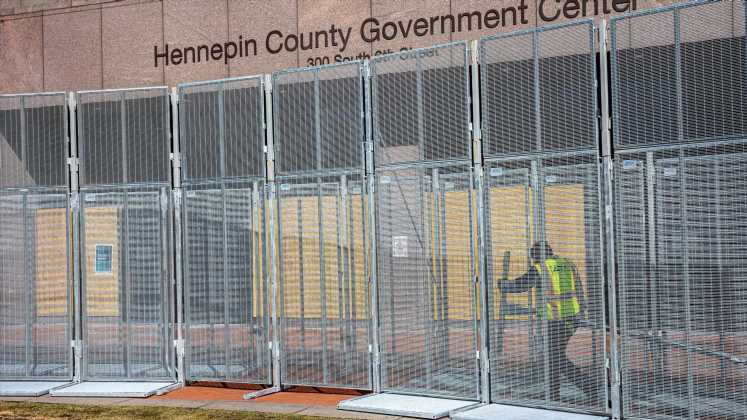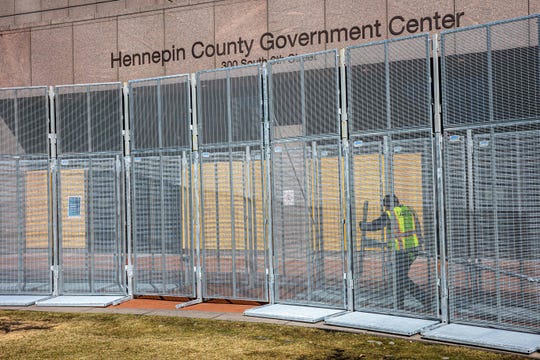MINNEAPOLIS — Jury selection is set to begin Monday in the trial of former Minneapolis police officer Derek Chauvin, charged with second-degree murder and manslaughter in the death of George Floyd last May.
Prosecutors contend Floyd, 46, was killed by Chauvin’s knee, compressed against Floyd’s neck for more than 9 minutes while he was handcuffed and pinned to the pavement.
Legal experts say bystander video of the incident, as well as two autopsy reports, will play central roles in the trial. The question at the heart of the case is whether what people saw on the video was murder or a terrible tragedy.
However, a Friday court ruling could postpone jury selection. A Minnesota appeals court ruled that a trial court judge should not have refused to reinstate a third-degree murder charge against Chauvin. It’s unclear what effect the ruling will have on that schedule, but the court asked Hennepin County District Judge Peter Cahill to reconsider the charge.
Here’s what to know:
- Jury selection is set to begin at 9 a.m. CT in Minneapolis, where 12 jurors and up to four alternates will be selected. It is expected to take up to three weeks, with opening arguments scheduled for March 29.
- Court TV will be broadcasting the court proceedings, but jurors will not be shown. Here’s how to watch.
- There have been a handful of peaceful protests leading up to the trial, with a demonstration planned Monday morning at the courthouse and a vigil Monday night at George Floyd Square. On Saturday, a man died in a shooting near the square.
The USA TODAY Network will be bringing you live coverage of the Derek Chauvin trial. Refresh this page updates. Follow our team of reporters on Twitter here. For news delivered to your inbox, sign up for the Daily Briefing newsletter.
Downtown Minneapolis: ‘We’re going to be out here until they remember’
Several businesses in downtown Minneapolis were boarded up Monday near the Hennepin County Government Center, which is surrounded by barbed wire, fencing and concrete barriers. Activists and artists were gathering in front of the courthouse, trying to process the anger that has been simmering in the city since Floyd’s death last May.
Leesa Kelly, founder of Memorialize the Movement, said she came to the courthouse to urge the city, the Minneapolis Police Department and Chauvin to reflect on the damage done to the community. “We’re going to be out here until they remember, until we see justice,” Kelly said. “It was heartbreaking, it was emotionally exhausting and draining. As a Black woman I felt broken.”
Kelly’s organization has collected more than 750 plywood art murals created during the protests, many of which they displayed in front of the courthouse Monday. Kelly, operations manager at the Minnesota African American Heritage Museum, said the murals are a “symbol of our collective grief.”
Athena Papagiannopoulos remembers feeling “shattered” when officer Jeronimo Yanez was acquitted after the fatal shooting of Philando Castile in 2016. She has been organizing protests since then, but said she feels like nothing has changed in Minneapolis. Papagiannopoulos said her organization is working with the Floyd family to plan more actions as the trial continues.
“I’m so angry, I’m so sad, it’s just so overwhelming,” said Papagiannopoulos, founder of Visual Black Justice. “The city will just burn again just like last summer if something isn’t done.”
Demonstration, vigil planned Monday
More than a dozen activist groups, including Black Lives Matter Minnesota and Communities United Against Police Brutality, plan a demonstration outside the courthouse Monday, starting at 8:30 a.m. CST, KARE 11 reported.
The George Floyd Global Memorial will hold a gathering with faith leaders at George Floyd Square at 8 a.m. CST, ending in a candlelight vigil at 6 p.m., some of which will be livestreamed, according to the group’s website. The square is at the intersection of East 38th Street and Chicago Avenue where Floyd died.
On Saturday, dozens of people gathered in front of the Minnesota governor’s mansion in St. Paul to demand accountability for police officers. Many of the roughly 150 people who demonstrated were family members of others who died during police encounters. Similar protests were being organized in cities around the country in advance of the trial of Derek Chauvin.
Minneapolis increases security
Last month, city officials began solidifying security plans and establishing a security perimeter around City Hall, nearby buildings and the courthouse where jury selection will begin Monday. Streets will be closed, businesses will be boarded up and National Guard troops and hundreds of law enforcement officers will be in place in anticipation of potential unrest during the trial, set to begin March 29.
A worker installs security fencing at the Hennepin County Government Headquarters in Minneapolis, Minnesota, on March 3, 2021. Security measures are being increased and expected to see more police and National Guard soldiers in downtown Minneapolis before jury selection begins at the trial of former Minneapolis Police officer Derek Chauvin in George Floyd's death on March 8. (Photo: KEREM YUCEL, AFP via Getty Images)
Last year, following Floyd’s death, rioting and looting broke out across the city over three nights, and hundreds of buildings were damaged, including some that were set on fire. Protests quickly spread beyond Minneapolis to Saint Paul, then across the nation of world. The large majority of protests throughout the summer were peaceful.
Last week, the U.S. House of Representatives passed a police reform bill named after Floyd, which would ban chokeholds and neck restraints at a federal level, among other major reforms.
A peaceful vigil at the George Floyd memorial at the Cup Foods Market at the intersection of E. 38th Street and Chicago Ave in Minneapolis on Monday, June, 1, 2020. George Floyd died in police custody on May 25, 2020 at this location. (Photo: Jack Gruber, USA TODAY)
Contributing: Associated Press
Source: Read Full Article

